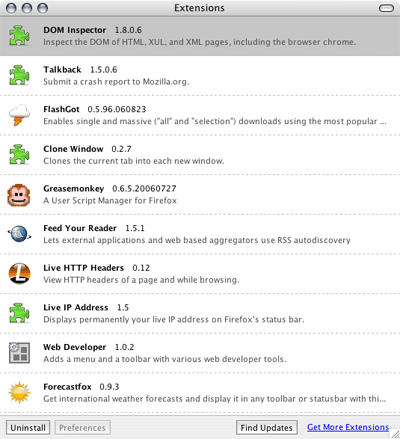-
good tips for speeding up Windows boot times
-
tons of data visualization ideas in one place. (also mentioned in Cal's talk.)
-
Cal's talk at fowa mentioned copious graphing for web ops. This was one of the tools he mentioned.
-
wikipedia article that includes Kollock's motivations for online contributions.
-
Mobile photography software from Yahoo. The auto-tagging is clumsy, but the tag-suggestion based on location looks nice.
-
Types of players in old-school MUDs--translates well to web application users.
-
Project Gutenberg: "This volume is a narrative of Scott's Last Expedition from its departure from England in 1910 to its return to New Zealand in 1913."
-
Holovaty.com advises newspapers to move from story-factories to databases
-
add geo data to photo exif data
Heading to the Future
I'll be in San Francisco next week for The Future of Web Apps conference/summit. Looks like a fun conference with great speakers. And it's always great to be in SF—see (a few of) ya there.
Now Hearing This
I added a sidebar to the front page here at onfocus that shows the last few albums (with cover art) I've listened to in iTunes. Let's skip why I might want to do this for now, and just jump into the how. People have been doing this since MP3 players have existed, and there are several services that can do this for you now. I send my tracks to Last.fm, and there's My Strands—both of these services have HTML snippets you can add to your site that will show some aspect of what you're listening to. Last.fm is great at putting together charts of tracks and artists, but does nothing with albums. So I had to code my own "now listening" widget to show recent albums. Here's how it works in case anyone out there wants to do something similar:
On My Server
My server has a Perl CGI script called getAlbum.cgi that accepts an artist and album name. Once getAlbum receives an artist and album, it searches for a match on Amazon via their API. If a match is found, it puts a little HTML together with the details, adds the album to a local HTML file: now-hearing.html, and removes the last entry. I include the file in my weblog, and that's what you see in the sidebar.
On My PC
With the server script in place, I just needed a little glue between the server and iTunes. A Windows script called now-playing.vbs checks to see if iTunes is open and playing, and then sends the current artist and album to the server. I set the script to run every 20 minutes with the Windows Task Scheduler. It doesn't grab everything that's playing (especially if I'm shuffling around), but it gets pretty close.
On My Mac
I use more than one computer, so I didn't want my Mac to be left behind. I set up an AppleScript that basically does the same thing as the PC script. Instead of using an outside process to run the script at regular intervals, I used the AppleScript idle handler to hit the server every 20 minutes. Then I set the script to open when I log in.
Here's the Code
If you want to try this setup, you can grab the code:
- getAlbum.cgi
- now-playing.vbs (for Windows)
- now-playing.app (for Mac OS X)
-
you can get the best of the web at mathowie's community blog (excepting pancakes)
-
"To investigate more formally, I purchased some time on a computer cluster and downloaded a copy of the Wikipedia archives. I wrote a little program to go through each edit and count how much of it remained in the latest version..."
Show and Tell: Firefox Extensions
Just set up a new instance of Firefox, and I had to figure out which extensions I couldn't live without. Here's a screenshot of the list:

And here are the details:

And here are the details:
- Dom Inspector and Talkback are installed by default.
- FlashGot - sends large files to a download manager like ReGet (PC) or iGetter (Mac).
- Clone Window - When you open a new tab or window you'll get the current URL instead of a blank page.
- Greasemonkey - Does anyone not have Greasemonkey installed? If I could only have one extension, this would be it. It customizes websites with user scripts.
- Feed Your Reader - Makes that orange feed icon in the address bar actually useful. I use it to subscribe to feeds at Bloglines.
- Live HTTP Headers - Useful for debugging web stuff. I don't often need the full power of Ethereal, so this extension will give me a look at the headers without the hassle.
- Live IP Address - I want to know what my IP address is. I'm a geek.
- Web Developer - This extension does a bunch of stuff, but I've found I use the no-cookies and no-CSS toggles most often.
- Forecastfox - I use it to show the current weather conditions in the lower-right corner because I don't get outside much. ;) The severe weather alerts are also handy.
-
looks better than parallels for running a single Windows app on OSX. (though I can't get this beta version to run.)
-
Marc Hedlund just started a blog for his personal finance startup
-
straight from YouTube to your iPod for $15. (Mac only.)
-
uses Internet Archive, Google, Yahoo!, and MSN caches to reconstruct a lost website